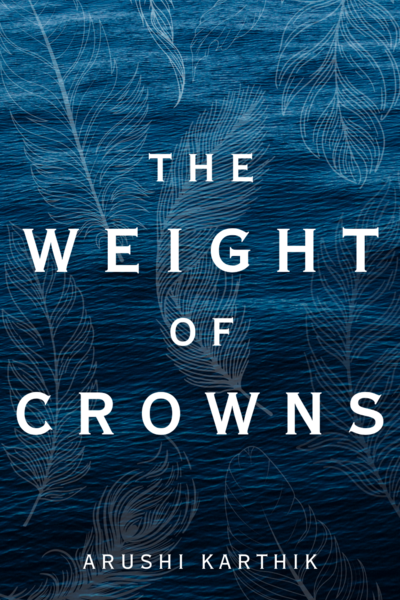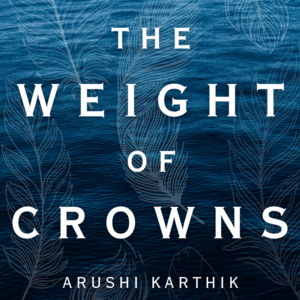Vayu threw off the veil and started to take off the heavy jewelry. It had been torture, standing there with so much weight on her body. She was reminded of how men were tied to boulders and their pockets filled with stones before they were thrown into the sea. She rubbed her neck as soon as she took off the massive earrings. So much jewelry, even though it was seen by no one.
Her maids put away the jewelry and started to undo the pins in her hair. It had been years since she’d done anything to her hair other than plait it. The current elaborate style, with strands of flowers woven into a bun at the nape of her neck was beautiful, but the the stems of the flowers itched and if she moved the wrong way, the pins dug into her scalp.
“Would you like us to draw a bath?” one of the maids asked. They were Nouminian, but too new to her for her to remember their names.
“Yes, please,” she answered. It was strange having people serve her again. At the monastery, she had been the servant. She served the priestesses and the abbesses diligently. She served the pilgrims who visited. Even though it was often thankless, difficult work, she had found fulfillment in it. Now, being waited upon was uncomfortable. Everywhere around her, she was overwhelmed by the opulence. The room she was in now had a massive oval mirror set in a gold frame, and she could recognize it was solid gold. In the mirror, she did not recognize herself. She was not used to looking into mirrors, but she could still tell the changes that had occurred in the last few months. She was not exactly a highborn young woman, but she was no longer novice Vayu either.
A decade had changed her more than she guessed. When she was the princess, everyone always said that she looked like her mother. She did not remember her mother, but she remembered the portraits of the first queen that used to hang in the castle’s corridors. Vayu looked nothing like her mother now. She was toned from physical work and browned by the sun. She had never received the education to possess the fluid grace of most noblewomen. Instead, she had adopted the no nonsense mannerisms of her teachers at the monastery.
Her rooms were at the opposite end of the manor from the crown prince. She had stood by his side for an entire day, but was left with no impression of who he was. He was different from her. He’d had a choice in whether or not to marry her. He had the support of his father, an emperor. No one had ever questioned his right to rule.
The differences did not end there. He was surrounded by people who he could trust. The people around her were at best strangers, and at worst spies. The maids her stepmother sent along with her never looked Vayu in the eyes. They whispered their suggestions and murmured secrets to each other. There was no telling who else they told their secrets to. Her friends in Hethyra had been sad to see her go. A few had insisted on accompanying her, but Vayu had declined. There was no telling what would be of her future, and if it was ruinous, she preferred to walk that path alone.
The servants returned from the bath chamber and guided her in. The bath tub was more of a pool, filled with heated water and scented oils. When she was a child, she was used to being bathed by her nanny. Disrobing in front of the servants, literal strangers, felt unnatural.
“I would like to bathe alone,” she said. “I shall call if I need anything.”
“Yes, your highness,” one of the girls said. She thought she heard a note of relief in her voice. She did not know how much had changed in the capital since she left. Once, a long time ago, she was considered the natural future queen. Ten years was enough for the peoples’ memory to fade. She was no one now. To most of the people in the capital, probably, and definitely to her maids, who were chosen by Queen Raval, she was something that had once been valuable, like currency no longer in use. They were probably well-bred girls, from good families. Such girls would think it beneath them to serve a common girl dragged back from the Barek monastery.
Perhaps the girls weren’t meant to spy on Vayu after all. When she thought about it, she had no secrets to hide. She was not plotting a rebellion, and most of her allies had moved on from her. She had been content at the monastery, and if Queen Raval had ever looked into her, she would’ve found that Vayu had accepted her new life wholly and completely. In reality, the more realistic purpose of the girls was to grab Prince Cheran’s attention. They were all pretty girls, and they were pretty in a way that Vayu no longer was. Soft skinned and soft spoken, they were far more the image of a blushing bride than she was.
She wondered if she could ever make up for her years of exile. She was unused to the complexities of court, but she had seen it even as a child. The words people said and the things they meant were entirely different in royal courts. Power was an unstable thing, being pulled in different directions. The nobles wanted to take power away from the royal family, the royal family wanted to keep the nobles in line. The peasants, of course, were too busy with survival to consider anything else.
Vayu emerged from the bathroom in the robe they had laid out for her. The maids were ready at the dressing table. The surface of the table was already covered with perfumes, creams to soften the skin, and oils for her hair. There was a basket filled with freshly picked flowers at the side of the table. One of the girls was threading jasmines and frangipani flowers into a straight garland. The dress they’d laid out for her was made of lace and silk, with embroidered white flowers with stems of gold silk thread. It was a suggestion of a piece of clothing, exposing far more of her skin than she was used to. The neckline touched her sternum. It was a beautiful by itself, but on a human body it was obscene. The maids dusted her shoulders and chest with a shimmery powder before they started working on her hair.
It was the one feature she possessed that she was proud of. Under the veils of the monastery, her hair had been spared exposure to the sun. It was the one source of her vanity. She had maintained it well, and now the dark waves reached her waist.
She expected them to plait her hair, but instead, the girls braided individual flowers into strands of her hair. The garland was turned into a flower crown atop her head. On top of the flowers, they placed a feather-light veil of pale gold silk. It was pretty, the veil and style again reminded her of how close she had been to becoming a priestess.
“Would you like a glass of wine to ease your nerves?” one of the maids asked.
Vayu shook her head. She wasn’t used to alcohol, and she was afraid it would dull her mind. The monastery never had much money, and most of the elders considered it a vice. She only had it on high holidays, and even then it was sips of home-brewed berry wine shared between her and other acolytes.
Once the prince arrived, she wanted to talk to him. He had not reached out to meet her before the wedding, and she hadn’t been allowed to speak to anyone until the vows were said and the marriage completed. Her disinterest in him lay in the fact that nothing would change by speaking to the prince before the marriage. His disinterest probably stemmed from the fact that she was just his first wife, not his only one. There would be more alliances made, and a number of young ladies who would be prettier, sweeter, and infinitely more eager to please.
She wasn’t sure what she would say, but they had to speak if they were to spend a lifetime together. She had to know where she stood, and what freedoms she could expect from him.
The girls set out fruits and wine. They set alight small lamps with scented oils and showered the bed in flower petals. It all felt like the preparation for a sacrifice instead of a wedding night. The smells were heady and overpowering, and Vayu was tempted to ask them to undo her hair. The crown braid was too tight, and it was starting to give her a headache.
It was fine. The waiting wouldn’t be long. It was already late into the night, and the festivities were over. The men might be enjoying a glass of port without the women, but he wouldn’t be expected to give anyone else his company this particular night. Or perhaps Daivian customs were different. Perhaps in this new, strange country women were made to wait all night without complaint, while men mourned the death of their freedom.
Two hours later, she gave up. Her headache had gone from dull irritation to a pounding menace that refused to abate. Her maids were gone, retired to their rooms. She took out the pins keeping the veil and her hair in place and let it fall, running her fingers through until it was devoid of tangles. Even by then, he did not come.
Her nightdress was too scant for her to be comfortable. She made her way to the trunks of clothing that arrived with her. Her entire trousseau was Raval’s selection, and utterly opposite to Vayu’s own taste. It was ridiculous that the queen even considered that she would look good in the tightly tailored outfits and deep necks. Vayu was not used to such fashion, not after a life of austere modesty at the monastery. Her discomfort showed in her posture, and what may have been flattering if she was confident in the clothing, was reduced to awkwardness.
She changed into one of her cotton nightdresses from the monastery, from her one trunk of possessions she was allowed to bring with her. It was a faded shapeless thing, softened by washing over the years, but it was familiar. She fell asleep quickly, the day’s tiredness depriving her of the ability to think about the prince’s absence or be offended at the slight.
In the morning, things might look brighter. At the very least, she could talk to the prince with a clear head, wearing proper clothing, without an expectation of marital responsibilities.











Comments (0)
See all